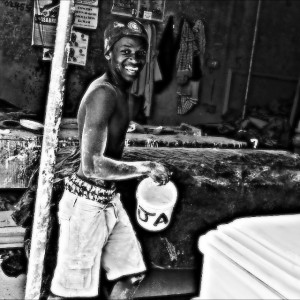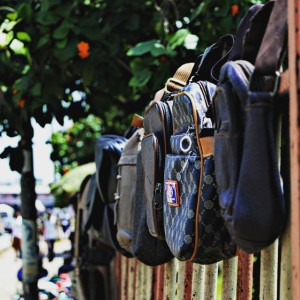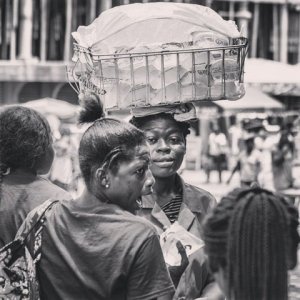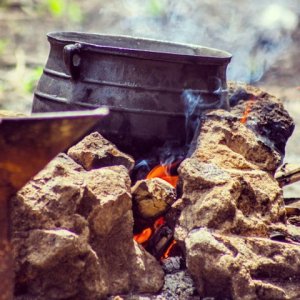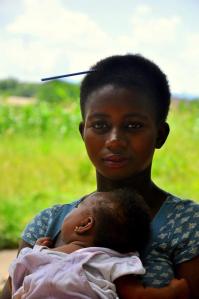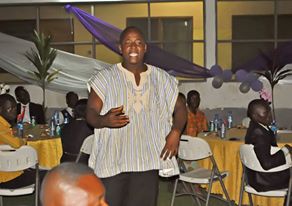(Culled from RESISTANCE, a collaborative project presented at BloggingGhana’s Blogcamp15)
Photography: Doris Kafui Anson-Yevu, Rasheeda Yehuza, Kobby Blay, Ato and Walter Zeiss.
Text: Kwabena Agyare Yeboah.
Life sprawls, assembling itself in tro-tros, buses, shops and on streets. As funeral songs gracefully bellow and stale the air, drivers toot horns as they drive by, as if they want to distract mourners. ‘’Living God’’ is an inscription on the windscreen of one of the tro-tros. At Labour roundabout, we face east, taking Asafo SSNIT as north. To the south is Asafo Interchange, an aorta of Kumasi. The sun is already up and both human and vehicular traffic are negotiating space for survival. The industry of Asafo is alive. No pain, no gain. That is what life means here. Work. Work. Hard work.
It might have been before or in1698. Osei Tutu had received a message from Kwaaman, the then Kumasi that his uncle Obiri Yeboah had died. He was technically, fugitive of Denkyira (Some sources say he impregnated Mansa, a sister of the then Denkyirahene whilst he was a prisoner at the Denkyirahene’s court and escaped to Akwamu. Their son is said to be Ntim Gyakari.) He did not want to return home but his friend Okomfo Anokye impressed on him to go because Anokye prophesied that he, Osei Tutu had a bright future as the head of a new nation. There at Akwamu, Osei Tutu was a great friend of the king, Ansa Sasraku. He learnt from the famed governorship of the Akwamus, living in Akwamufie as a guest of the empire. When Osei Tutu finally decided to go home, Ansa gave him a strong escort of warriors. This was to wade off the Denkyiras. At Kwaaman, those warriors settled at Asafo, Adum and Bantama. Under Osei Tutu’s leadership and Okomfo Anokye’s guidance, together with the military intellect that was imported, the Ashanti Empire was born, bred and blossomed into greatness. [1] [2]
Waving at us is the one-storey Department of Labour office that that roundabout is named after. We negotiate our way upwards, following the tarred road to Prempeh Assembly Hall. Tro-tros pull up at the Bus Stop just in front of the Labour Office. Some of them groan. We face the Asafo Coffin Market head on.
At the heart of Asafo’s existence is the simple act of resistance. Something it has carried in its DNA as it evolves. What do you do with what life throws at you?
A man makes coffin. He is at the last stage of the process. His job is to spray the exterior of wooden boxes that the carpenters have nailed into being.
He works on the interior, still at the spraying section which is meters away from where the carpenters gather and fashion these creatures.
We get close to the end of the road that we follow. At the Prempeh Assembly Hall, we take the left road that leads to the SIC building. We chance on two funerals, side by side. In the air, a cathedral flags us.
The street is blocked. Few meters from the funeral ground, kids run around, playing and screaming. They jump and chase football. They slip in between the trucks that are parked on the edges of the street. This is momentarily a commentary – partly a celebration of life and partly living it.
When we descend this street, we will come to the Highway that leads to Kumasi Central Market. We will turn right and pursue the Asafo Interchange which will lead us to the Asafo Market. 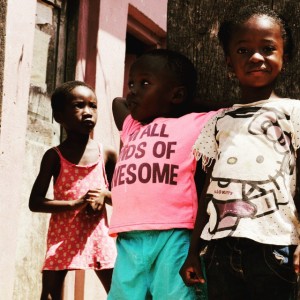
On the same street, these girls pose for our cameras.
We get closer to the Asafo Interchange. On the walls of Queen Elizabeth II School, school bags are displayed for sale.
Some of our team members buy water at Asafo Market, the meat section.
As the smell of meat and fish filter through the air, we assemble our presence through alley. We snake to the old Kumasi Train Station in minutes.
By 1898, the colonial Gold Coast Administration had started building the railway system in the country. In 1903, the Kumasi Train Station was completed. Here was once upon the time, the second largest train station in Ghana. There were two lines that trafficked between Kumasi and Accra; one was Kumasi-Accra line and the other was Accra-Kumasi line. There was the Takoradi line too. These lines had stop-overs in many towns along the countryside.
We come in confrontation with remnants of yester-year days.
No-one is here to board train. It is rather a home to many who have come to live here. Some of the rail lines are buried deep in the ground. At certain portions, some lines have been removed or buried completely. There is a firewood industry that gathers at a region. Weeds grow, kind of forming fields. Rusty poles sprout, hoisting notifications that have completely outlived their relevance.
Food is on fire!
Notification of load limit.
‘’What do you want for mother’s day?’’
‘’Mosquito net.’’
Under this Neem tree, people sit to have conversation, drink alcohol and smoke weed.
Most likely, the first attempt at statehood in Ashanti’s history began with Obiri Yeboah. He organized clan-houses so they could resist Denkyira’s military power. They were people who came together because of war (3sa nti fo)), which got corrupted to Asante and Ashanti.) It was about resistance. It was taking the future on and believing it. It was about ordinary people believing in leadership. Like every nation that develops, the notion was that a country is built with strangers. It happened right here in Asafo. In Adum. In Bantama.
And we bear witness to this city’s triumph and sorrows. Of its internal struggles and memory. Of its character as persona and heart-breaks. Within this curious collusion, a part of a city helps the whole by questioning it. As an observer of urban spaces, I know what it means. It is poetic.
